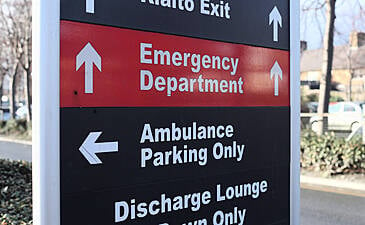HSE chief executive Paul Reid has admitted that nobody wants their elderly parents to spend hours on hard chairs or trolleys awaiting hospital admission whilst stressing that the pandemic has placed extraordinary demands on the health service.
In an interview on Morning Ireland, on RTÉ Radio 1, Mr Reid said that efforts are being made to reduce emergency department waiting times in a period of major pressure on the health service.
Prior to the interview with Mr Reid the show played an interview with Caroline O’Connell, whose 82-year-old mother Angela waited 24 hours for a bed at Wexford General Hospital last Friday.
Mr Reid acknowledged that “none of us would want the experience for their loved ones that Angela experienced".
Infection control measures
He stated the first 20 weeks of the year have been among the worst for hospitals as they bid to cope with an influx of patients and infection control measures for Covid-19.
“What we have seen in the first twenty weeks of this year is twelve of the highest weeks ever on record for emergency department presentations. Up to about 30,000 per week.
"Particularly in those aged 75. You just take last week versus the equivalent week last year post lockdown. We are up about 35 percent presentations of older people and up about twenty percent on 2019.
"Thankfully, many people are living longer, and living longer at home. Which is just the demographics we are dealing with. But we are also seeing people delaying their care throughout the whole Covid period and returning to hospital with serious frailty issues.
"The experience that has impacted on our emergency departments has been throughout that whole period we had very significant numbers of outbreaks (of Covid) in nursing homes. About sixty to seventy percent of nursing homes had outbreaks of Covid.
"Thankfully less impactful in terms of illness but it did impact on us in terms of being able to discharge people and that in turn creates a whole flow of congestion within the hospital system. And ultimately it impacts on emergency departments.”
Staffing issues
Mr Reid said obviously during that period they were also dealing with very significant staffing issues through Covid.
“Thankfully a lot of those issues are improving. Nursing homes where they have more capacity, and we are discharging more people. Only about ten to 12 percent of nursing homes now have some levels of outbreaks. Our delays in discharge are coming down. Less people on trolleys. But I do fully acknowledge the impact that it has had through that whole period.”

Mr Reid added that they are focused on reforms within emergency departments and strategic reforms outside the ED to reduce the level of presentations coming forward.
“There is no doubt the average can distort the experience in some hospitals and improve the experiences in others. We know that significant congestion has occurred in some hospitals more than others. Some hospitals have greater capacity to discharge people for rehabilitation to other smaller hospitals. Some don’t have that capacity.
"We are specifically focused across all the hospital systems on putting in place many reforms we had in place through Covid and strengthening those. So older people more and more are receiving their treatment outside the hospital system. These things take time but it is the right things we are resourcing.
"Within the emergency department itself we are very focused on initiatives around greater screening processes with the local community and local GPs. We are finalising emergency department specific plans for each emergency department in each hospital. We are scaling up recruitment. It is about very specific targeted intervention.”







